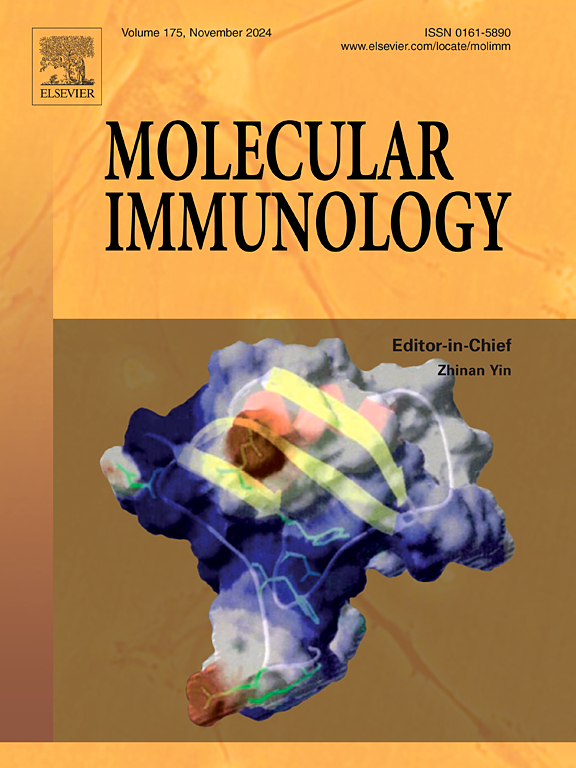在黑色素瘤模型中,体外预激活改变了过继转移CD8+ T细胞的体内分化
IF 3
3区 医学
Q2 BIOCHEMISTRY & MOLECULAR BIOLOGY
引用次数: 0
摘要
tcr特异性CD8+ T细胞的过继转移为在抗肿瘤免疫框架内研究肿瘤特异性CD8+ T细胞反应提供了一个强大的实验平台。这些转移细胞的遗传调控为阐明T细胞分化和功能的内在分子机制提供了强有力的策略,从而为优化肿瘤免疫治疗中肿瘤特异性CD8+ T细胞抗肿瘤免疫提供了重要见解。该方法的一个关键方面是原代T细胞的体外激活,这就提出了关于预激活对后续T细胞分化影响的重要问题。在这项研究中,我们探索了预激活CD8+ T细胞的分化轨迹,并使用小鼠黑色素瘤模型对其表观遗传和转录谱进行了全面表征。我们的研究结果表明,体外预激活不仅可以减缓肿瘤引流淋巴结(tdln)的终末衰竭进程,还可以增强肿瘤微环境(TME)中CD8+ T细胞的干细胞样特征。利用全面的ATAC-seq和RNA-seq分析,我们证明了预激活调节CD8+ T细胞的表观遗传景观和转录谱,促进tdln中效应物相关的分化,同时促进TME中干细胞相关的编程。这些发现突出了体外预激活对肿瘤特异性CD8+ T细胞分化途径的深远影响,强调了在相关研究中考虑这些实验框架诱导的差异以更准确地解释数据的必要性。本文章由计算机程序翻译,如有差异,请以英文原文为准。
Ex vivo pre-activation shifts the in vivo differentiation of adoptively transferred CD8+ T cells in a melanoma model
Adoptive transfer of TCR-specific CD8+ T cells represents a powerful experimental platform for investigating tumor-specific CD8+ T cell responses within the framework of anti-tumor immunity. Genetic modulation of these transferred cells provides a robust strategy to elucidate the intrinsic molecular mechanisms underlying T cell differentiation and functionality, thereby offering critical insights to optimize tumor-specific CD8+ T cell antitumor immunity in cancer immunotherapy. A key aspect of this approach is the ex vivo activation of primary T cells, which raises important questions regarding the impact of pre-activation on subsequent T cell differentiation. In this study, we explored the differentiation trajectories of pre-activated CD8+ T cells and performed a comprehensive characterization of their epigenetic and transcriptional profiles using a murine melanoma model. Our findings revealed that ex vivo pre-activation not only attenuates progression towards terminal exhaustion in the tumor-draining lymph nodes (TdLNs) but also enhances the stem-like characteristics of CD8+ T cells within the tumor microenvironment (TME). Leveraging comprehensive ATAC-seq and RNA-seq analyses, we demonstrated that pre-activation modulates the epigenetic landscape and transcriptional profile of CD8+ T cells, fostering effector-related differentiation in the TdLNs while promoting stemness-associated programming in the TME. These findings highlight the profound influence of ex vivo pre-activation on the differentiation pathways of tumor-specific CD8+ T cells, underscoring the necessity of taking these experimental framework-induced discrepancies into consideration for more accurate data interpretation in relevant researches.
求助全文
通过发布文献求助,成功后即可免费获取论文全文。
去求助
来源期刊

Molecular immunology
医学-免疫学
CiteScore
6.90
自引率
2.80%
发文量
324
审稿时长
50 days
期刊介绍:
Molecular Immunology publishes original articles, reviews and commentaries on all areas of immunology, with a particular focus on description of cellular, biochemical or genetic mechanisms underlying immunological phenomena. Studies on all model organisms, from invertebrates to humans, are suitable. Examples include, but are not restricted to:
Infection, autoimmunity, transplantation, immunodeficiencies, inflammation and tumor immunology
Mechanisms of induction, regulation and termination of innate and adaptive immunity
Intercellular communication, cooperation and regulation
Intracellular mechanisms of immunity (endocytosis, protein trafficking, pathogen recognition, antigen presentation, etc)
Mechanisms of action of the cells and molecules of the immune system
Structural analysis
Development of the immune system
Comparative immunology and evolution of the immune system
"Omics" studies and bioinformatics
Vaccines, biotechnology and therapeutic manipulation of the immune system (therapeutic antibodies, cytokines, cellular therapies, etc)
Technical developments.
 求助内容:
求助内容: 应助结果提醒方式:
应助结果提醒方式:


